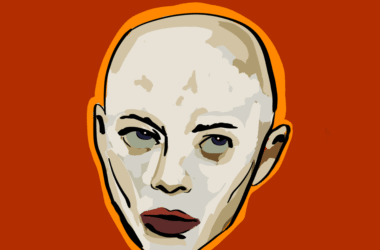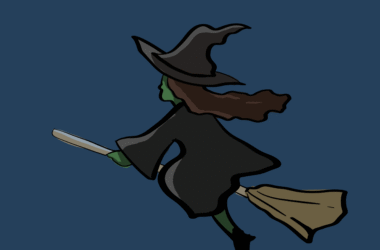Perhaps inspired by the trials of his conflicted protagonist, director Max Zidel ambitiously attacks Aeschylus’ three-part tragedy in The Oresteia Rewritten, now on at Players’ Theatre. The result of his efforts: a powerful and unexpectedly fast-paced reproduction full of sound and fury.
From early on in the play it is clear that trying to accurately trace a detailed plot, let alone three, from this feverish production is a fool’s errand. As a result. the world we enter in the third-floor orifice of the Shatner Building is constantly shifting, and full of in-your-face conflict.
As the main character, Orestes, wrestles with classic tragedian struggles (murdered parents, political allegiances, and arduous journeys), the audience is beckoned away from the epic hero’s journey and invited to participate in the mental process of his struggle. As the chorus chants eerily in unison, we are fully transported to the world of this disturbed psyche.
Zidel and musical director James Campbell use the classical palette through powerful imagery and pulsating musical chorus-to-character back-and-forth to explore how we wrestle with ourselves and our choices. Carrying the burden of these choices, Orestes (David Armstrong) is able to capture and hold the audience’s attention because he is so completely self-possessed on stage. He reacts spontaneously and subtly to the familial conflict surrounding him and eventually to the conflicting voices of “The Furies” in his maddened mind.
The bloody encounters between Orestes’s parents, King Agamemnon and his wife Clytemnestra, are conveyed solidly by Cam Oram and Jamie Munro, respectively. As their disputes heat up in the first act, Munro takes control of her part with a rigid and unforgiving physicality. Hatef Mottaghi plays a pensive and cleverly probing Menelaus, Agamemnon’s brother and advisor, who at times steals the stage from his sibling.
When the re-written parts of the dialogue get a little bit too Disney, with lines like, “I don’t know what love means anymore,” the viewer can still rely on the frantic and spontaneous actions of the Chorus — functioning as a “conscience posse” for Orestes—to bring us back to the lively inner conflict around which the play revolves. Notable among the chorus is Emily Murphy, who is able to deliver gestures that border hauntingly on epileptic.
Feathers, unkempt hair, and dark, other-worldly makeup give the chorus a folklore quality that helps the show break away from its classical origins and into more mythical, timeless territory. Driving many scenes into this territory is the prophesying Oracle played by Lerato Islam. Islam is stunning in a shimmering dress and vibrant shawl, and commands the stage with a visceral voice.
The set functions well in stationary scenes, but in a show that is meant to transport us to radically different environments, it sometimes has a cumbersome quality. Similarly, the lighting in the small theatre works very well at casting powerful shadows when the action is focused, but struggles to define the more mobile scenes. One example of this occurs when Orestes and his sister Electra (played youthfully and convincingly by Annie MacKay) revisit their convoluted past, their father’s grave symbolically lit from above at centre stage.When the production comes together in all its elements, which it does brilliantly and miraculously at times, we can see the heavy backdrop of the set as a sort of mythic and powerful stomping ground.
The Oresteia Rewritten grapples with the daunting challenges of combining ancient and modern dialogue, staging an amphitheatre-sized epic in a small black box theatre and, most obviously, condensing three plays into one that runs for an hour and a half long. The product is very satisfying. While Zidel may not have been looking to create a faithful representation of the tragic trilogy, he clearly had good reasons for grounding his hyper-creative visions in the work of the Greeks. Bring a friend and a flask, because it may be the only chance you’ve got hear the word “fuck” belted out of the ancient house of Atreus.
The Oresteia Rewritten runs at Player’s Theatre January 26-29.






